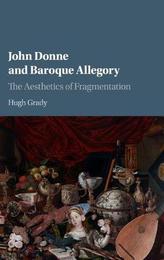
|
John Donne and Baroque Allegory: The Aesthetics of Fragmentation
Hardback
Main Details
| Title |
John Donne and Baroque Allegory: The Aesthetics of Fragmentation
|
| Authors and Contributors |
By (author) Hugh Grady
|
| Physical Properties |
| Format:Hardback | | Pages:236 | | Dimensions(mm): Height 235,Width 158 |
|
| Category/Genre | Literary studies - general
Literary studies - c 1500 to c 1800
Literary studies - poetry and poets |
|---|
| ISBN/Barcode |
9781107195806
|
| Classifications | Dewey:821.3 |
|---|
| Audience | | Professional & Vocational | |
|---|
| Illustrations |
Worked examples or Exercises; 1 Halftones, black and white
|
|
Publishing Details |
| Publisher |
Cambridge University Press
|
| Imprint |
Cambridge University Press
|
| Publication Date |
10 August 2017 |
| Publication Country |
United Kingdom
|
Description
John Donne has been one of the most controversial poets in the history of English literature, his complexity and intellectualism provoking both praise and censure. In this major re-assessment of Donne's poetry, Hugh Grady argues that his work can be newly appreciated in our own era through Walter Benjamin's theory of baroque allegory. Providing close readings of The Anniversaries, The Songs and Sonnets, and selected other lyrics, this study reveals Donne as being immersed in the aesthetic of fragmentation that define both the baroque and the postmodernist aesthetics of today. Synthesizing cultural criticism and formalist analysis, Grady illuminates Donne afresh as a great poet for our own historical moment.
Author Biography
Hugh Grady is Professor Emeritus of English at Arcadia University, Pennsylvania. His published works include The Modernist Shakespeare (1992), Shakespeare, Machiavelli, and Montaigne (2002), and Shakespeare and Impure Aesthetics (Cambridge, 2009). He has also edited four critical anthologies and published a number of articles, most of which have investigated ways in which contemporary critical theory can be applied to works of early modern literature.
Reviews'Grady carefully rehearses the critical transition from the modernist to the postmodernist Donne, which he describes as essentially the transition from aesthetic unity to fragmentation. He also reviews all or most previous attempts to situate Donne's poetics in the perspective of baroque art, which leads to a fairly exhaustive review of major critics from T. S. Eliot, I. A. Richards, and Cleanth Brooks through Anthony Mazzeo, Mario Praz, and Louis Martz.' Catherine Gimelli Martin, Modern Philology '[John Donne and Baroque Allegory] offers a number of new perspectives, introducing, for example, a series of early modern and more contemporary European voices to Donne studies ... As such, this is a book which will no doubt play an important role in inspiring future creative interventions in Donne studies.' Emma Rhatigan, Modern Language Review
|